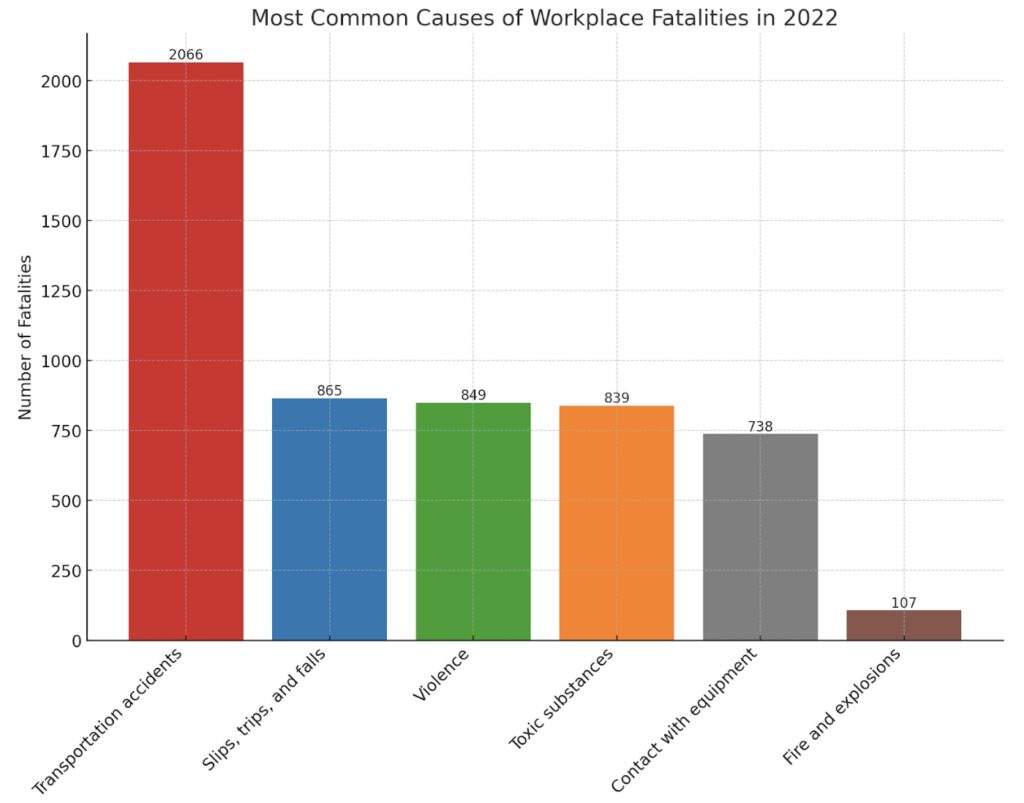In the wake of an unimaginable loss, the last thing anyone wants to worry about is filing paperwork and meeting legal deadlines.
At Nomberg Law Firm, our dedicated Birmingham workers’ compensation attorneys understand the immense grief and confusion that families face when they tragically lose a loved one in a work-related accident.
We’re proud to have assisted many local families in similar situations, helping to navigate the legal process and taking the burden off their shoulders so they could focus on healing.
This article is intended to help families understand their rights to workers’ comp death benefits, outlining who is eligible for these benefits, the necessary steps to file a claim, and the time limits to be aware of.
Our goal is to empower you with the knowledge and resources you need so you can receive the support you deserve.
How many work-related deaths are there in the U.S. annually?
Unfortunately, work-related deaths in the U.S. have been increasing in recent years. According to the U.S. Bureau of Labor Statistics, in 2022 alone, 5,486 workers died due to work-related injuries, an increase of 5.7% from 2021. This includes the deaths of 74 workers in Alabama.
That’s equivalent to about 1 death every 96 minutes.
The industry that experienced the highest number of deaths was transportation and material moving, with 1,620 fatal work injuries reported, followed by construction and extraction, with 1,056 fatal work injuries (an 11.0% increase from 2021).
What is the leading cause of death on the job?
In 2022, the top causes of workplace fatalities included:
- Transportation incidents – 2,066 fatal injuries, or about 38% of workplace fatalities
- Falls, slips, and trips – 865 fatalities, with about 81% involving falls to lower levels
- Violence from people or animals – 849 fatalities, with about 25% occurring in retail or while dealing with customers
- Contact with objects and equipment – 738 fatalities, an increase of 4.7% from 2021 and the highest number since 2018.
- Fires and explosions– 107 fatalities
Also of note, workplace deaths from exposure to extreme temperatures increased by 18.6% in 2022, with 51 deaths reported, 43 of which were caused by heat.

What happens if your spouse dies at work?
If your spouse dies at work in Alabama due to a work-related injury, illness, or disease, you and their children may be entitled to workers’ compensation death benefits. These benefits provide financial support to help cover funeral expenses and a portion of the deceased’s lost wages.
Workers’ compensation death benefits are no-fault, meaning you do not need to prove that the employer was at fault for the death.
Instead, it only needs to be shown that the death was directly related to your spouse’s job. This system ensures that families receive the necessary support without the burden of lengthy legal battles over fault.
Occupational Diseases & Alabama Workers’ Compensation
Understand when an occupational disease might be covered under workers’ compensation and how to prove it’s work-related.
What are the death benefits for workers comp in Alabama?
In Alabama, workers’ compensation death benefits are calculated based on the deceased employee’s average earnings at the time of the accident:
- For 1 dependent. The dependent is entitled to receive 50% of the employee’s average weekly wage, subject to the maximum and minimum limits in effect at the time of the accident.
- For 2 or more dependents. The dependents are entitled to two-thirds of the employee’s average weekly wage, also subject to the maximum and minimum limits in effect at the time of the accident.
Please note that death benefits are payable for up to 500 weeks, but certain situations, like getting remarried, can impact how long you can ultimately receive them.
In addition to the weekly benefits, the employer is responsible for covering burial expenses up to $6,500, regardless of any private burial insurance the deceased may have had.
Are workers’ comp death benefits taxable?
No, workers’ compensation death benefits are not taxable. This means the amount you receive may be similar to the take-home pay the deceased was earning before their death, as no taxes will be deducted from the benefits.
Alabama company facing fines in wake of worker’s death
In March 2024, the Occupational Safety and Health Administration (OSHA) announced that the death of 38-year-old Michael Thompson at Cullman Casting Corp. could have been prevented with basic safety measures and proposed $95,981 in fines for 6 serious violations following his death.
In August 2023, Thompson was pinned by a molding machine while adjusting it due to the company’s failure to properly de-energize and lockout the machine during maintenance.
OSHA found that Cullman Casting exposed workers to hazards by not implementing or inspecting lockout/tagout procedures, failing to train employees, and lacking proper machine guarding. “This tragic incident should never have occurred,” said OSHA’s area office director in Birmingham, Joel Batiz.
This case underscores the preventable nature of many workplace deaths and the importance of strict safety protocols across Alabama and the U.S.
Who is eligible for workers’ comp death benefits in Alabama?
In Alabama, the following individuals may be eligible for workers’ compensation death benefits:
- Spouse. The surviving spouse is typically the primary beneficiary and is entitled to receive death benefits.
- Children. Dependent children, including biological, adopted, and stepchildren, are eligible for benefits. This generally applies to children under the age of 18 or those up to 25 if they are full-time students.
- Other dependents. If there is no surviving spouse or children, other family members who were financially dependent on the deceased worker may be eligible. This can include parents, siblings, or other relatives who relied on the worker’s income for support.
The exact determination of dependents and the distribution of benefits are guided by Alabama’s workers’ compensation laws and are often decided by the court based on individual circumstances.
How long do I have to file a workers’ comp claim for death benefits in Alabama?
In Alabama, you have 2 years from the date of the worker’s death to file a claim for workers’ compensation death benefits.
To begin the process, here are the steps you need to follow:
- Report the death. Notify the deceased worker’s employer about the death as soon as possible. This is necessary to start the claim process.
- Gather documentation. Collect all necessary documents, including the death certificate, proof of relationship to the deceased (such as marriage or birth certificates), and any medical records related to the injury or illness that caused the death.
- Submit the claim. Verify that the deceased’s employer files a formal claim for death benefits with their workers’ compensation insurance provider. You should also file a completed claim form and supporting documents with the Alabama Department of Labor.
Do I need an attorney to help with a workers’ comp claim for death benefits?
Workers’ compensation death benefits are supposed to help surviving family members like you, but sometimes things don’t go smoothly, and the last thing you want to deal with in the aftermath of losing a loved one is complicated paperwork and legal battles.
While legal help might not always be necessary, here are some reasons why you might need an experienced workers’ compensation attorney on your side:
- Complex paperwork and deadlines. The legal process involves a lot of paperwork and strict deadlines. Missing a deadline or making an error in the paperwork can jeopardize your claim. For example, if you’re unsure about how to document your loved one’s earnings or prove dependency, an attorney can ensure everything is correctly filed.
- Denied or disputed claims. Insurance companies sometimes deny claims, arguing that the death was not work-related or that the deceased was not an eligible employee. If your claim is denied, an attorney can help you gather evidence and represent you in appeals. For instance, if the employer claims your spouse’s death was due to a pre-existing condition rather than a workplace incident, an attorney can help prove otherwise.
- Maximizing benefits. Insurance companies might offer less than what you’re entitled to. An experienced attorney knows how to negotiate for a higher settlement that reflects your true loss.
At Nomberg Law Firm, our experienced Birmingham workers’ compensation attorneys understand what you’re going through. We’ve helped many families navigate this difficult process, ensuring they receive the benefits they deserve.
Let us be your advocate and handle all the legalities for you so you can focus on what matters most—healing and rebuilding your life.
Reach out to us today for the support you need by scheduling a free consultation.
References
Fatal Occupational Injuries in Alabama — 2022 : Southeast Information Office : U.S. Bureau of Labor Statistics. (n.d.). Bureau of Labor Statistics. Retrieved May 23, 2024, from https://www.bls.gov/regions/southeast/news-release/fatalworkinjuries_alabama.htm
U.S. BUREAU OF LABOR STATISTICS. (2017). Census of Fatal Occupational Injuries Summary, 2017. Bls.gov. https://www.bls.gov/news.release/cfoi.nr0.htm

